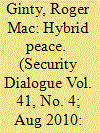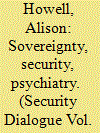|
|
|
Sort Order |
|
|
|
Items / Page
|
|
|
|
|
|
|
| Srl | Item |
| 1 |
ID:
099568


|
|
|
|
|
| Publication |
2010.
|
| Summary/Abstract |
Anticipating the strategic confluence between liberal ways of war and liberal ways of development, the ideas of Michel Foucault have increasingly resonated in the field of security studies. Foregrounding in particular the biopolitical imperative at the heart of liberal governance, critical attention has been given to the manner in which life itself becomes the principle referent object for security practices. In mapping out these key debates, this article will nuance our understanding of Foucault's relevance by explaining: how liberal security governance today operates within a globally inclusive imaginary to the defection of all meaningful Newtonian distinctions; how liberal biopolitics displaces the bare life of the sovereign encounter with the bare activity of species survival; how principally tasking security practitioners with sorting and adjudicating between different forms of species life reveals a distinct biopolitical aporia, in the sense that making life live demands the elimination of that which poses an internal cultural threat to its will to rule; how the rationalization of violence through doing what is necessary out of species necessity implies that humanity's most purposeful expression appears through the battles that are waged upon life, for life, on a planetary scale; how the liberal encounter has created conditions akin to a global state of civil war that offers a marked conceptual departure from traditional sovereign paradigms; and why the onto-theological dimensions that give moral sanction to liberal biopolitical rule now demand the most serious critical attention.
|
|
|
|
|
|
|
|
|
|
|
|
|
|
|
|
| 2 |
ID:
099567


|
|
|
|
|
| Publication |
2010.
|
| Summary/Abstract |
This article is interested in the interface between internationally supported peace operations and local approaches to peace that may draw on traditional, indigenous and customary practice. It argues that peace (and security, development and reconstruction) in societies emerging from violent conflict tends to be a hybrid between the external and the local. The article conceptualizes how this hybrid or composite peace is constructed and maintained. It proposes a four-part conceptual model to help visualize the interplay that leads to hybridized forms of peace. Hybrid peace is the result of the interplay of the following: the compliance powers of liberal peace agents, networks and structures; the incentivizing powers of liberal peace agents, networks and structures; the ability of local actors to resist, ignore or adapt liberal peace interventions; and the ability of local actors, networks and structures to present and maintain alternative forms of peacemaking.
|
|
|
|
|
|
|
|
|
|
|
|
|
|
|
|
| 3 |
ID:
099569


|
|
|
|
|
| Publication |
2010.
|
| Summary/Abstract |
In recent considerations of deterrence in strategic studies, there are almost no works that would systematically link deterrence to one of the most important current issue areas of contemporary strategic studies: ballistic missile defence (BMD). In an attempt to address this lacuna, this article considers ways in which missile defence has been - and can be - intertwined with deterrence of the 21st century. The article begins with a historical outline of the relationship between nuclear deterrence and BMD, and continues by comparing and contrasting US political and strategic-planning discourses in how they have addressed the examined relationship. What follows is the recasting of traditional understanding of deterrence as a set of disparate modalities underpinned by different principles and organizing logics. The article will show the role and function of BMD in three relevant modalities of deterrence in the 21st century: first, in a renewed strategic deterrence between the USA and Russia based on an axiomatic logic of MAD; second, in the deterrence of rogue states in reaction to their asymmetric nuclear threats; and, finally, in a reverse deterrence from intervention in regional conflicts. Consequently, the presented outline of the three modalities will be theoretically furthered to allow for conceptualization of possible links to BMD in ways in which practical implications for future research, strategic planning and political action can be seen.
|
|
|
|
|
|
|
|
|
|
|
|
|
|
|
|
| 4 |
ID:
099566


|
|
|
|
|
| Publication |
2010.
|
| Summary/Abstract |
This article seeks to draw out an understanding of the role of narratives and discourses of race, culture and civil society within international peacebuilding, through the location of the discourse of culture as a transitional stage between interventionist and regulatory discourses of race and civil society. It particularly seeks to highlight that the discourse of culture is key to understanding the peacebuilding discourses of intervention and regulation that have developed in the last decade. This is all the more important as the discourse of culture has in many respects been displaced by the discourse of civil society. In drawing out the links between the framings of race, culture and civil society, the article seeks to explain how the discourse of civil society intervention has been reinvented on the basis of the moral divide established and made coherent through the discourse of culture, and how the discourse of civil society contains a strong apologetic content, capable of legitimizing and explaining the persistence of social and economic problems or political fragmentation while simultaneously offering potential policy programmes on the basis of highly ambitious goals of social transformation.
|
|
|
|
|
|
|
|
|
|
|
|
|
|
|
|
| 5 |
ID:
099565


|
|
|
|
|
| Publication |
2010.
|
| Summary/Abstract |
This article examines how psychiatry has been used as a technology of security in post-'liberation' Iraq. Drawing on Foucault and Foucauldian work on the history and sociology of medicine, it begins by tracing how, from the 19th century onwards, psychiatry has instantiated its authority through a claim to provide social security within national spaces, both through methods of sovereign confinement and through liberation and governance. Arguing that the various 'psy' disciplines - and medicine more generally - are increasingly used as technologies of security internationally, the article examines psychiatric practice in Iraq, where patients in the Al Rashad psychiatric institution were accidentally liberated from their confinement by US Marines in 2003. Iraq's 'mentally ill' were initially considered a manageable security threat and thus subject to liberal community governance efforts. Yet, after the so-called suicide bombing of two pet markets in 2008, reportedly by former Al Rashad patients, those deemed 'mentally ill' and others associated with them were once again made subject to sovereign confinement, marking a failure in liberal governance. Thus, this article seeks to explore some of the complex lines connecting sovereignty,
|
|
|
|
|
|
|
|
|
|
|
|
|
|
|
|
|
|
|
|
|